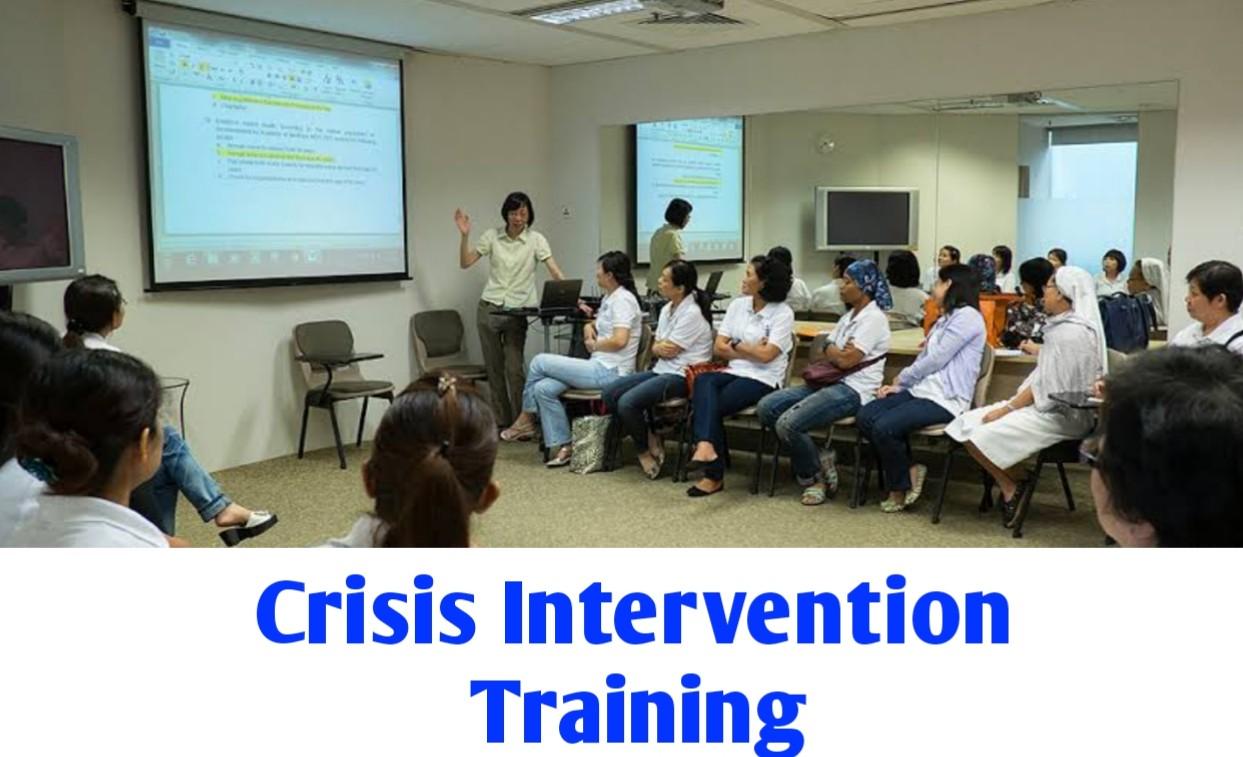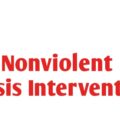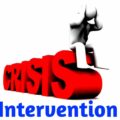Definition of Crisis intervention
Crisis intervention refers to the methods used to offer immediate, short-term help to individuals who experience an event that produces emotional, mental, physical, and behavioral distress or problems. A crisis can refer to any situation in which the individual perceives a sudden loss of his or her ability to use effective problem-solving and coping skills. A number of events or circumstances can be considered a crisis: life-threatening situations, such as natural disasters (such as an earthquake or tornado), sexual assault or other criminal victimization; medical illness; mental illness; thoughts of suicide or homicide; and loss or drastic changes in relationships (death of a loved one or divorce, for example).
Purpose of Crisis intervention Training
Professional training provides an individual with new horizons, expanding their knowledge base and brushing their skills. A Crisis intervention Training course will help you access yourself, helping you to know yourself better by exploring your motivation to do better, to lead, and to excel in whatever you do. To sum it up, your emotional intelligence, your interpersonal communication skills, your level of understanding, and other qualities will be put to test so you can come out victorious as an individual.
Understanding the Purpose of Crisis intervention
Crisis intervention has several purposes. It aims to reduce the intensity of an individual’s emotional, mental, physical, and behavioral reactions to a crisis. Another purpose is to help individuals return to their level of functioning before the crisis. Functioning may be improved above and beyond this by developing new coping skills and eliminating ineffective ways of coping, such as withdrawal, isolation, and substance abuse. In this way, the individual is better equipped to cope with future difficulties. Through talking about what happened, and the feelings about what happened, while developing ways to cope and solve problems, crisis intervention aims to assist the individual in recovering from the crisis and to prevent serious long-term problems from developing. Research documents positive outcomes for crisis intervention, such as decreased distress and improved problem-solving. All these purposes require an up-to-date professional therapist in tune with modern-day techniques and principles in crisis intervention. Crisis Intervention Certification and training available include:
Crisis Intervention Certification
The American Institute of Health Care Professionals, Inc. offers a comprehensive, quality, Crisis Intervention Certification program for qualified professionals including, physicians, nurses, counselors, social workers, and other professional providers in “Crisis Intervention Counseling.”
Objectives of the Crisis Intervention Consulting Certification Program are:
- Provide a high-quality program of Certification for professionals practicing crisis intervention and crisis counseling through crisis intervention courses.
- Develop and support high standards of education and practice requirements for the attainment of the crisis intervention certification.
- Provide a mechanism for the ongoing involvement of a peer advisory board of qualified professionals to oversee program development and requirements for certification.
- Provide society with a mechanism to ascertain the appropriate education, skills, knowledge, and experience required by professionals who offer such services.
- Establish quality standards and requirements for the re-certification of its credentialed members, attesting to ongoing education and skill attainment in the practice specialty of crisis intervention and crisis counseling.
- Provide a comprehensive program of approvals for continuing education, seminars, offerings, independent study, and other related educational activities, to ensure high-quality standards are met and that such programs are of value to professionals practicing crisis intervention and crisis counseling.
Certification
Certified Crisis Intervention Counselor – requires attainment and/or verification of one of the following certification criteria:
- Completion of an official established education program to prepare individuals for the practice of Crisis Intervention Counseling. Educational programs must have provided a minimum of 275 hours of lecture/study in crisis intervention courses. Candidates for certification must present valid evidence of successful completion of such a program. The AIHCP review board will review and approve programs on an individual basis. Once a program is approved, it will be published as “approved” by the AIHCP. Programs submitted for approval consideration must have their curriculums specifically based in Crisis Intervention Counseling. To view approved programs and courses, click here. Candidates who can demonstrate evidence of successful completion of such programs within a two (2) year period prior to the date of application for certification, are eligible to apply for and be considered for certification as a Crisis Intervention Counselor. Such programs may include university and college-based courses, continuing education seminars, retreats, self-study and distance learning programs, etc. The American Institute of Health Care Professionals, Inc, offers a full program of continuing education courses in Crisis Intervention Counseling and Consulting. Completion of these courses qualifies the educational component necessary to apply for Certification. Click here to view the full program.
Requisite for all Applicants for Crisis Intervention Counseling Certification:
In addition to meeting the educational criteria as provided above, applicants for Certification must meet one of the following prerequisites to enter this program:
- A registered nurse currently licensed to practice nursing
- A licensed social worker
- A health care licensed professional
- A health care provider with a minimum of an associate degree
- A licensed counselor or psychologist
- Hold a bachelor’s degree or higher in psychology, human services, or other health-related field
- Is in current practice as an ordained minister/clergy
- Is currently practicing as a crisis counselor
- Currently employed in criminal justice or fire sciences
- A certified or licensed emergency medical technician
- Currently employed in disaster response or disaster relief
If you would like to find out if you meet the qualifications for this certification program. Please submit an Inquiry Form at the following link: Access Here.
Certification – Identification & Credentials
Those applicants who become certified by the AIHCP in Crisis Intervention Counseling may use the initials/credential CIC-CSp., after their names: “Crisis Intervention Counselor-Certified Specialist
Timeline: All certifications shall be for a period of 4 years from the date that the initial certification is awarded.
SAMHSA Crisis Counseling Assistance and Training Program
This training facilitated by SAMHSA provides paraprofessional crisis counselors with basic crisis counseling skills through a series of online and in-person training modules. The trainings are best suited for counselors employed by a Federal Emergency Management Agency CCP grant, but may also be useful for crisis counselors in other settings. Click Here
Algonquin Nonviolent Crisis Intervention Training
The training program in nonviolent crisis intervention provides participants with proven strategies for safely defusing anxious, hostile, or violent behavior at the earliest possible stage. Included in the workshop are topics such as recognition of behavior levels in a crisis, para verbal communication, precipitating factors, staff fear and anxiety, decision making, disengagement skills, holding skills, and postvention debriefing. Click Here
Relias Non-Violent Crisis Intervention
This accredited online continuing education course on Non-Violent Crisis Intervention provides instruction for anyone providing training to agency staff in the use of seclusion, restraint, or isolation and in developing alternatives to the use of such restrictive interventions in their organization. In conjunction with taking this course, the trainer should access all courses in the crisis management curriculum to train learners in these techniques. All courses in the curriculum are designed for staff who work with individuals who use services for mental health, developmental disabilities, substance abuse, community health, substance use disorder, and other types of healthcare. Trainers are free to add specific content that relates to the specialized population they serve and addresses their needs, such as sexual abuse, deaf and hard of hearing, children, and the elderly. The curriculum includes measurable learning objectives, appropriate and measurable testing on those objectives and measurable methods for determining passing or failing the course. Click Here
Benefits Of Crisis Intervention Courses and Training
A crisis intervention training course is designed to meet the needs of every individual irrespective of their cognitive range, verbal ability, behavioral disorder, or any other special need. Participants learn the importance of observing and understanding all the possible factors that make behavior challenging and the most efficient way to intervene according to each situation. Although the emphasis is on verbal methods of de-escalation, some nonviolent methods of physical restraint are also taught during training. This helps reduce the number of disruptive incidents within the organization.
Benefits of Nonviolent Crisis Intervention Training to an Organization Proven strategies for safety, violent behavior can be reduced or eliminated completely as such;
- It helps reduce incidents of injury in the workplace
- It helps your business meet accreditation standards
- It minimizes liability
- It improves staff retention
- It helps your business comply with legislative mandates
- Demonstrates that your organization is committed and willing to contribute to a safer community
- It helps you create and maintain a caring, respectful, and safe environment for those being served and your staff.
Benefits of Crisis Intervention Training to Staff
The training reduces the risks of staff injury around the workplace. It drastically reduces the occurrence of injury associated with physical intervention
- It will improve the level of mature communication among staff because it establishes a common language
- It will boost the level of staff confidence to step up and verbally intervene
- It will alleviate the degree of stress and anxiety that can arise as a result of uncertainty and confusion
- It will make every member of staff feel safe at work again
- Benefits of Nonviolent Crisis Intervention Training to Those You Serve
- It allows them to live, learn and thrive in an environment that is safe and respectful
- They can comfortably interact with some positive role models who are equipped to manage even the most difficult situation
- They will become active participants in the process of debriefing and learn coping skills
- They will feel supported by empathic, compassionate, and respectful staff
- They will be able to receive guidance about positive behavioral choices.





